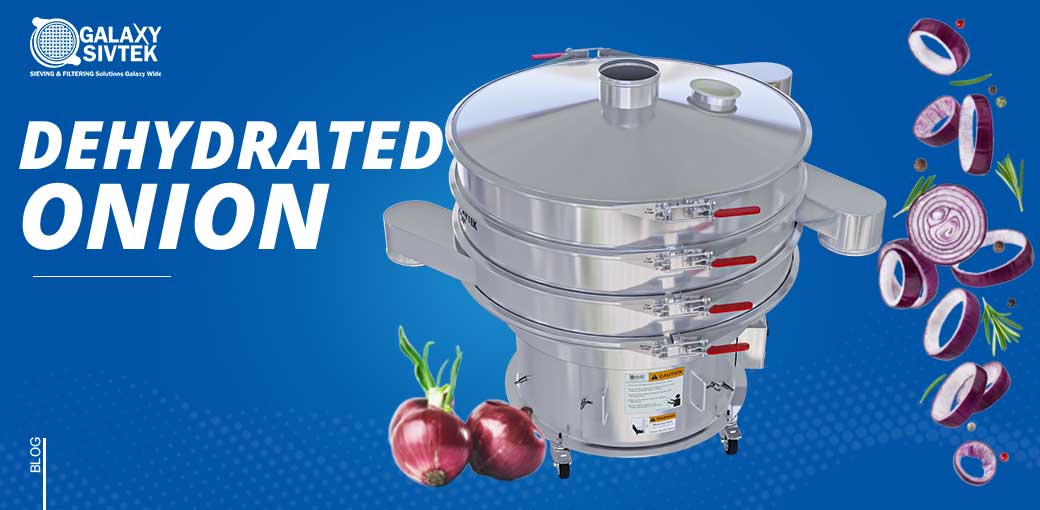
Committed To Quality, Committed To You
In this blog we will walk you through the farm-to-table journey of dehydrated onion, types & varieties of dehydrated onion, its usage & application along with information about where & why our FDA-complied sifters play a vital role in its manufacturing process.
Dehydrated onions are the dried and dehydrated powder & granule version of onion that could be preserved from 1 to 8 years (depends upon packaging) and used as & when required.
Dehydrated onion flakes & powder have a wide range of uses. It is used as a seasoning in a variety of dishes, used as a prime ingredient in making commercial food products such as sauces, snacks & drinks, and used as a substitute for fresh onion in cooking as it is easy to handle & eradicates the need of chopping fresh onions, used as an ingredient to make various mixed spices, & more other usages.
Dehydrated onion is used as a substitute for fresh onion not only as it reduces the efforts of chopping a fresh onion, but it also has immense health benefits. Dehydrated onions are low in fat & calories, and rich in potassium & calcium.
Dehydrated onions are available in different sizes on market, from flakes to chopped, to minced, to granules, to powder form. The initial process of every type of dehydrated onion remains similar.
Let us now know the manufacturing process of dehydrated onions along with where & why our sifters & sorters play a crucial role in their manufacturing process.
The process of making dehydrated onions starts the growing & cultivating onions. Farmers grow & supply fresh onions to manufacturing units.
Once the onions received are stored & unloaded as & when required. The unloaded onions are then peeled off to remove the unwanted outer portions. Peeled onions are sent to a water tunnel where they are washed in 90-100 PPM Sodium Hypochlorite solution to remove dirt.
Once the onions are properly washed, they are sent to a slicing machine for slicing & chopping the onions. Sliced onions are then fed in an imperial dryer for dehydrating & drying. Total of five stages of the automatic drying process takes place to make sure the taste & aroma of onion stays intact.
Dried & dehydrated kibbles are then passed on Vibro sieving machines to remove skin, husk & uneven-sized dehydrated onion.
Our robust linear & rectangular machine Linea Sivtek® could be the capitalizing option for sieving dehydrated onion.
Further to remove impurities like unwanted black particles, the dehydrated onions are passed through an optical color sorter machine.
The product is then passed through magnetic rods or magnetic separator belts to remove the ferrous metal impurities that could have been entered during the above process.
Galaxy Sivtek has a wide range of magnetic solutions from magnetic rods to a magnetic belt that could be the best option for removing ferrous impurities.
As per the buyer persona & market demand, dehydrated onions are milled & ground into chopped, minced, granules & powder form.
Once the dehydrated onion is milled in the desired size, the next process is grading, de-dusting, sieving & safety screening for products derived from the dehydrated onion. In total 5 different sized products are derived from the dehydrated onion.
1. To obtain a quality contamination-free product (removing unwanted foreign particles)
2. To obtain uniformity in size (passing it through different sized mesh opening screens)
Our wide range of round Vibro screens & centrifugal sifters like Sivtek Vibro Separator®, Sivtek Tumbler Screen®, Inline Sivtek®, and Sivtek Roto Sifter® has a proven record in screening, sieving & grading dehydrated onion.
The sieved & screened product is then weighed, packed & sealed in moisture resistance or moisture-proof poly bags. These poly bags are now packed in corrugated boxes or paper bags & are ready for dispatch.
Galaxy Sivtek’s machines have been serving the food industry since the day of establishment. We have mastered the art of manufacturing Vibro gyratory screens, rotary & rectangular sifters, and automatic filters that are exclusively designed for the food industry.
– Our machines are in compliance with FDA & cGMP.
– Our machines are available in high-quality corrosion-free material i.e. Stainless Steel
– Our machines have crevice-free joints & welding that enable zero product contamination.
– Our machines come with food-grade internal parts like a food-grade rubber gasket.
– Our machines require minimal maintenance & have a long life span.